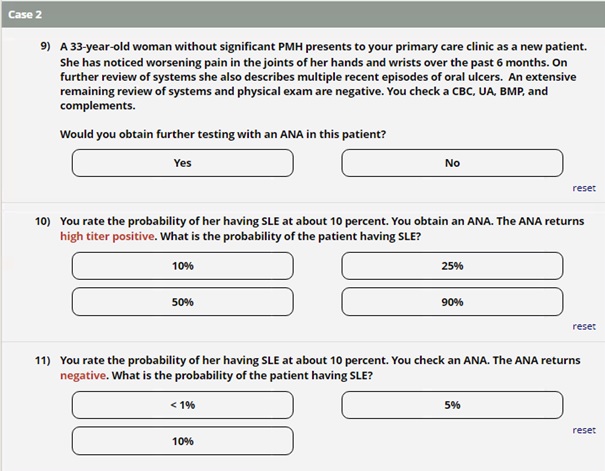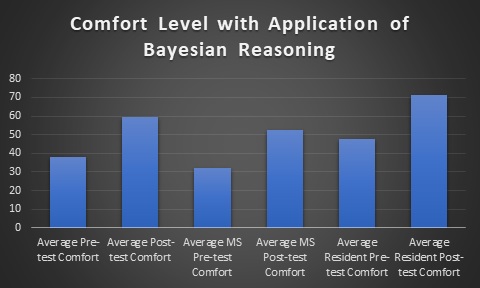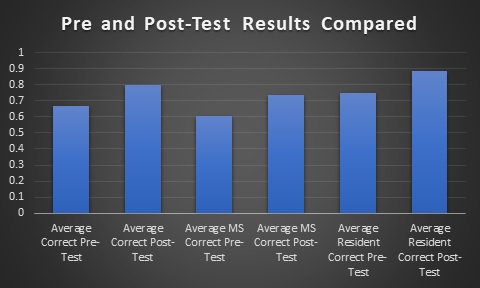Session Information
Date: Monday, November 9, 2020
Session Type: Poster Session D
Session Time: 9:00AM-11:00AM
Background/Purpose: Evidence-based medicine (EBM) is becoming an increasingly important skill in the clinical application of diagnostic reasoning. Didactic lectures focusing on EBM concepts are a common tool to teach trainees the skills to accurately assess and apply scientific information into clinical practice. However, this instruction format has not been demonstrated to be optimal for retention and application of knowledge. Other methods for learning statistics and critical appraisal certainly exist and include modules, self-directed programs, and problem-based learning.
We sought to create a brief module with the inclusion of adult learning theories to optimize delivery of knowledge of EBM concepts to residents and medical students and to assess the yield of the learners. Our purpose was to assess whether the use of this module would: 1) Increase learner comfort in the clinical application of likelihood ratios and 2) Improve appropriate application of rheumatologic testing at our center with this intervention.
Methods: The study was conducted at Virginia Commonwealth University School of Medicine (VCU SOM). We developed a short PowerPoint-slide based module with pre and post-test focused on application of Bayesian reasoning. Internal medicine residents and medical students on their rheumatology rotations were asked to complete our module. The pre-test was done immediately prior to the module and the post-test immediately following completion of the module. The test included 14 case-based questions evaluating application of Bayesian reasoning. An example of a typical case-based application question is included in Figure 1. Data was collected and stored on a secure cloud-based program, then analyzed using the student’s t-test.
Results: A total of 12 trainees completed the pilot module with the pre-test and post-test. Five of the trainees were internal medicine residents and seven trainees were medical students. Baseline mean pre-test scores were 66.6% correct and the mean post-test score was 79.8%. Pre-test scores (P-Value = 0.0701) and post-test scores (P-Value = 0.0809) were not significantly different when comparing internal medicine residents to medical student. Completion of the EBM module led to significant improvement from pre- to post-test scores with a mean improvement of 13.20% (P-Value = 0.0147) as well as an improvement in comfort level of 21 points overall on a 1-100 scale (P-Value = 0.0082.
Conclusion: Our pilot study suggests that integrating rheumatology-oriented EBM didactics within internal medicine residency curriculum and internal medicine rotation of medical students results in immediate improvement and comfort with application of EBM concepts. The growing complexity of diagnostic testing in medicine and especially rheumatology highlights the importance of applying approachable and pragmatic methodology to appropriately utilize these tools. Re-testing after 12 months to evaluate durability of knowledge is a logical next step. We plan to continue to encourage trainee participation in our module. The module serves as a portion of the larger virtual curriculum that we are building at the VCU SOM for didactics in rheumatology.
 Example of the Survey Questions
Example of the Survey Questions
 Figure 2 – Comfort Levels from 0-100
Figure 2 – Comfort Levels from 0-100
To cite this abstract in AMA style:
Gavin J, Fadel K, KC Y, Dombrosky E, Johnson S, Syed H, Rubinstein B, Danielides S, Nandan A. Teaching Clinical Application of Bayesian Reasoning in Rheumatology to Internal Medicine Residents and Medical Students [abstract]. Arthritis Rheumatol. 2020; 72 (suppl 10). https://acrabstracts.org/abstract/teaching-clinical-application-of-bayesian-reasoning-in-rheumatology-to-internal-medicine-residents-and-medical-students/. Accessed .« Back to ACR Convergence 2020
ACR Meeting Abstracts - https://acrabstracts.org/abstract/teaching-clinical-application-of-bayesian-reasoning-in-rheumatology-to-internal-medicine-residents-and-medical-students/

